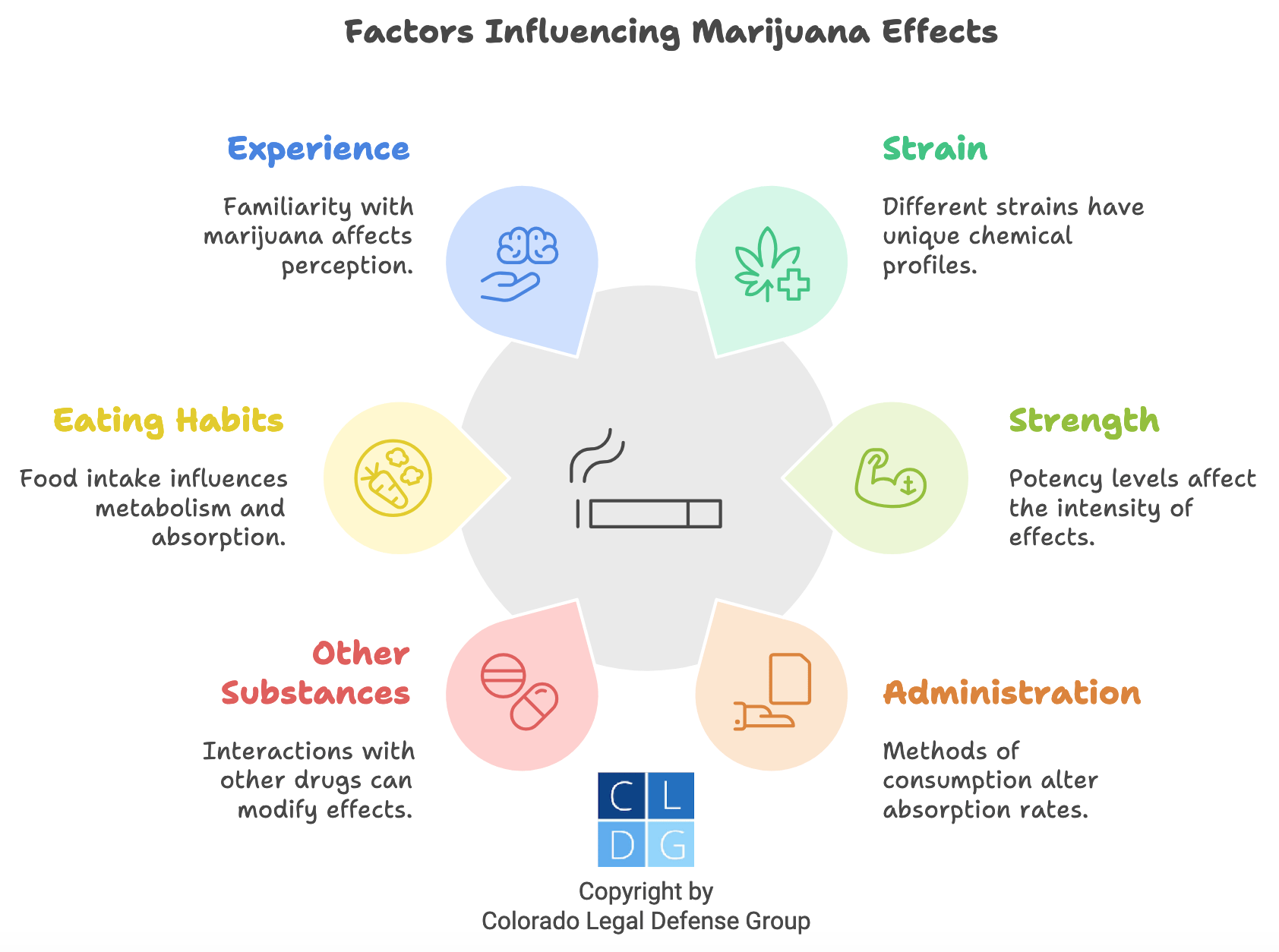The recreational use of marijuana is now legal in Colorado. However, DUI of marijuana remains a crime.
You can be charged with DUI if the marijuana made you substantially incapable (mentally or physically) of safely operating a vehicle. If you were only slightly impaired, you would then face charges of DWAI (driving while ability impaired).
The same penalties apply whether you were under the influence of alcohol or marijuana, as the following table shows:
| Misdemeanor Offense | Jail Sentence | Can a judge suspend jail? | Probation | Fine | Public Service | License Revocation |
| 1st DUI of marijuana | 5 days – 1 year | Yes, with alcohol/drug evaluation and alcohol education | Up to 2 years | $600 – $1,000 | 48 – 96 hours | 9 months |
| 1st DWAI of marijuana | 2 days – 180 days | Yes, with alcohol/drug evaluation and alcohol education | Up to 2 years | $200 – $500 | 24 – 48 hours | none |
| 2nd DUI/DWAI of marijuana in 5 years | 10 days – 1 year | No, though court can grant home detention | 2 – 4 years | $600 – $1,500 | 48 – 120 hours | 1 year |
| 2nd DUI/DWAI of marijuana after 5 years | 10 consecutive days – 1 year | No, though court can grant home detention | 2 – 4 years | $600 – $1,500 | 48 – 120 hours | 1 year |
| 3rd DUI/DWAI of marijuana | 60 consecutive days – 1 year | No, though court can grant work release or community corrections | 2 – 4 years | $600 – $1,500 | 48 – 120 hours | 2 years |
Note that a fourth-time DUI/DWAI of marijuana is a class 4 felony, carrying two to six years in Colorado State Prison and/or $2,000 to $500,000 in fines.
The primary difference between DUI/DWAI of alcohol and of marijuana is that with alcohol, you can choose to take either a breath test or a blood test following your arrest. If you are suspected of having consumed marijuana, you must take a blood tests since breath tests cannot detect drugs.
Below our Colorado DUI defense lawyers discuss the following topics:
- 1. DUI of Marijuana
- 2. DWAI by Marijuana
- 3. Illegal Amounts
- 4. Chemical Tests
- 5. Defenses
- Additional Resources
1. DUI of Marijuana
You drive under the influence (DUI) of marijuana in Colorado when, as a result of consuming marijuana, you are substantially incapable, mentally and/or physically, to safely operate a vehicle. Under 42-4-1301, C.R.S., a DUI of marijuana is usually a misdemeanor.
Unlike alcohol, there is no DUI “per se” of marijuana. DUI of drugs must be proved by objective evidence that you were unable to drive safely.
Courts can make a “permissible inference” that you drove under the influence of marijuana if your blood contained 5 nanograms or more of delta 9-tetrahydrocannabinol (THC) per milliliter.1 However, even this amount of THC in the blood is not conclusive.2
Evidence of Impairment
To prove you guilty of DUI of marijuana, the prosecutor will need to show that you were actually too stoned to drive safely. Such evidence might include:
- You violated Colorado traffic laws,
- You were weaving in and out of your lane,
- You drove too fast or too slow,
- You appeared stoned (bloodshot eyes, slurred speech),
- The officer smelled marijuana in the car,
- There was marijuana paraphernalia in the vehicle (such as, rolling papers, a bong, a joint clip, etc.), or
- Marijuana was found in your car.
If you have a medical marijuana registry card, that alone is not enough evidence for the police to insist you take a blood test.3 Also, your card cannot be used as part of the prosecutor’s case-in-chief against you.4

Colorado courts can infer you committed DUI if you had a blood-marijuana-concentration of at least 5 nanograms per millimeter.
2. DWAI by Marijuana
You drive while ability impaired (DWAI) by marijuana when weed affects you in “the slightest degree.” This means you are less able mentally and/or physically to operate a vehicle than you ordinarily would have been. Under 42-4-1301, C.R.S., DWAI of marijuana is usually a misdemeanor.
It does not take much impairment in order to be guilty of DWAI. If you are lawfully arrested on suspicion of DWAI of marijuana, the amount of THC in your blood will be just one factor for the jury to consider.5
3. Illegal Amounts
Colorado has no set limit for how much marijuana can be in your system when you drive. The effect of marijuana can vary depending on many factors, as the following graphic shows.

As discussed above, a Colorado jury may infer you committed DUI of marijuana if your blood test showed at least five nanograms or more of THC per milliliter of your whole blood.6
4. Chemical Tests
By driving in Colorado, you give your “express consent” to take a chemical test if you are lawfully arrested for DUI or DWAI.
If only alcohol use is suspected, you can choose to take a breath test or a blood test. If, however, the officer reasonably believes you were using drugs, you may be required to take a blood test instead of — or in addition to — a breath test.7
Refusing a Colorado DUI chemical test has serious consequences, including a one-year license revocation.8 Plus, the police can get a warrant to take your blood by force.9
5. Defenses
Here at Colorado Legal Defense Group, we have represented literally thousands of people accused of driving under the influence of marijuana. In our experience, the following five defenses have proven very effective with prosecutors and judges.
- The officer had no probable cause to arrest you. We have seen police arrest people for DUI just for being uncooperative or talking back, not because they exhibited any signs of being under the influence. If we can show the judge that you were the victim of a “false arrest,” they may dismiss your entire case.
- The police did not administer the field sobriety tests correctly. We can often use the police officer’s own dashcam and bodycam footage to show that the police gave you the wrong instructions or scored you incorrectly. If we can get the D.A. to see that the police committed misconduct, they may offer to drop your charge or reduce it to a traffic infraction.
- Improper procedures were used for your blood test. Perhaps your sample was contaminated, or there was a broken chain of custody of your sample. We have even seen phlebotomists take blood after letting their certifications lapse. Once we show the judge your sample was compromised, they should suppress it as evidence.
- You suffered from a medical condition that resembled being high. We had clients in the throes of a seizure or diabetic coma, and police mistook their symptoms as being under the influence of marijuana. Your charge should be dismissed once we show the D.A. your medical records.
- You drove poorly for reasons unrelated to marijuana use. If you were merely tired, sick, or distracted, no DUI occurred. We would argue to prosecutors that at most you committed a minor traffic infraction and that your criminal charge should be dropped.

DUI of marijuana carries the same penalties as DUI of alcohol in Colorado.
Additional Resources
For more information, refer to the following:
- Colorado DUI Laws – Detailed explanation by Colorado’s Office of Legislative Legal Services.
- The DUI Process – Step-by-step overview by the Colorado DMV.
- Impaired Driving – Safety video by the Colorado Department of Transportation.
- MADD Colorado – Organization devoted to ending DUI, including by presenting victim impact panels.
- Colorado NA – A 12-step program for overcoming addiction.
Legal References:
- 42-4-1301(6)(a)(IV), C.R.S. Halter v. Department of Revenue, Motor Vehicle Div., (Court of Appeals of Colorado, Division Four, 1993) 857 P.2d 535; People v. Raider (2022) 516 P.3d 911.
- So-called high cannabidiol (CBD) strains of marijuana contain relatively little THC. It is often consumed by users of medical marijuana who do not want to get high. It is still unlawful, however, to drive after consuming high CBD weed if it affects your driving.
- 42-4-1301(6)(k), C.R.S.
- 42-4-1301(6)(j), C.R.S.
- See 42-4-1301(6)(a)(I). If at the time you alleged alcohol, your blood alcohol content was .05% or less, it shall be presumed that you were not under the influence of alcohol and that your ability to operate a motor vehicle was not impaired by alcohol.
- CRS 42-4-1301.
- CRS 42-4-1301.1. Colorado state troopers have begun experimenting with a roadside saliva test for marijuana. However, as yet this test has not been officially adopted as a preliminary field sobriety test.
- 42-2-126, C.R.S.
- Missouri v. McNeely, (2013) 569 U.S. 141, 133 S. Ct. 1552.
